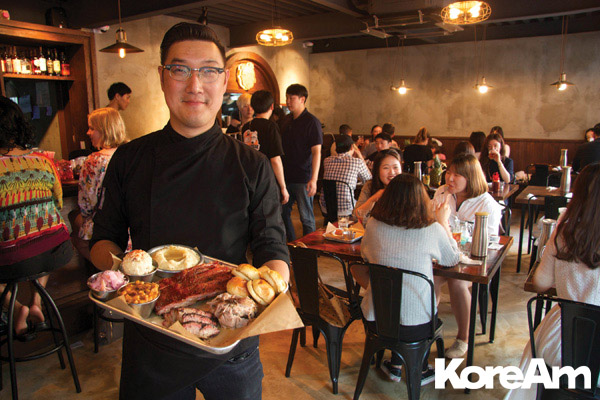Smokin’ in Seoul
With his Alabama-style barbecue, Linus Kim carves out a niche in Itaewon’s expanding food scene.
by YOUNG-JIN KIM
When Linus Kim opened a Southern-style barbecue restaurant last year in Itaewon, in central Seoul, he knew he would at least find a following among expats.
The Birmingham, Alabama, native had already established his barbecue street cred by selling pulled pork and beef brisket— meats cooked overnight until deliciously tender—through a series of pop-up events. Each time, a throng of foodies—mostly expats, but some adventurous Koreans as well—would show up and buy all the finger-licking inventory.
He worried, however, about whether mainstream Korea would follow suit.
“Koreans have this fear of blackened food,” said Kim, 40, referring to the dark, flavorful rind that forms on meat as a result of the smoking process. “I had really been concerned about that, whether they would take to it or they would just think it was burnt.”
His concerns, fortunately, proved unwarranted. Just over a year after opening, Linus’ Bama Style Barbecue (Linus’ BBQ, for short) has become a darling of Seoul’s evolving food scene. Koreans, expats and American soldiers routinely form a line outside the establishment, anxious to get a taste of authentic, competition-quality barbecue and this uniquely American experience in the center of Seoul.
“[Linus’ BBQ is] this weird oasis where foreigners like to come. In fact, that’s why Koreans like to come—because they really feel like it’s America,” said Kim, an affable, energetic presence who intermittently slips into a Southern accent, during an interview at a nearby café on an early July afternoon.
“Just out of my preferences and the things I like, and the way I built the restaurant, I’ve been able to transport people to another place, and that makes me happy.”
While traditional American barbecue, most prevalent in the South and Midwest, has experienced a renaissance in the United States in recent years, many Koreans’ exposure to it is limited to chain restaurants such as TGI Friday’s. This remains the case despite the emergence in recent years of a small handful of American-style smokehouses in Seoul, including Linus’ BBQ.
Barbecue styles vary by region, but generally involve smoking meat at a low temperature for a long period of time. Pulled pork, for example, starts as a tough cut of meat known as pork shoulder and cooks for up to 16 hours in a smoker until tender enough to be “pulled” into pieces.
Kim serves Alabama-style barbecue, known for its tangy vinegar-based sauce. When smoking meat, Alabamans often use hickory wood, which lends a strong flavor, but Kim uses applewood, widely available in Korea and known for a subtler flavor.
Linus’ BBQ’s popular combination platter comes piled high with pulled pork, brisket, ribs and butter-toasted buns, along with sides like coleslaw and “skinny-ass” fries. Diners can share the dish and make their own sliders, a process Kim likened to Koreans wrapping grilled meat in leafy vegetables, or ssam.
“The culture of Korean eating is sharing, and [the platters are] very conducive for sharing,” Kim said. “It was a happy coincidence.”
The menu is rounded out by side dishes like deep-fried bacon-jalapeño mac-and-cheese balls and fried okra.

Located at the end of a small alley, the restaurant is a hodgepodge of themes cobbled together by Kim. A large outdoor patio with picnic tables and tiki torches make for a fireside atmosphere, while the interior has the feel of a saloon. Doo-wop and Motown music fill the air, which, along with the use of vintage Coke bottles, contribute to a retro vibe. A movie theater marquee sits atop the restaurant carrying the mischievous message, “If it goes in greasy, it comes out easy.”
“It feels like a secret place,” said Lim Jae-hoon, a 32-yearold office worker who came for dinner with a group of friends on a warm July evening. “There are always people standing in line, and more people probably come because of that.
“The atmosphere is American-style, so we can talk freely while we eat and drink.”
While Kim developed a love for Southern food at a young age, he didn’t consider carving a career path out of it until relatively recently. After attending college in Atlanta, Kim worked in “a bazillion” jobs, from event planning to telecommunications, bouncing from the South to New York to Los Angeles. In 2011, he and a friend came to Korea to work on an independent video project about expats trying to survive as food consultants.
The project never materialized. But a Seoul café owner enlisted his help to throw a special event, so Kim fashioned a makeshift smoker from a hibachi grill and pans, and made pulled pork sliders. The event was a hit. Kim soon began supplying restaurants with barbecued meat and eventually started to organize pop-ups, or supper clubs that operate out of temporary spaces. He knew, however, that he still had much to learn.
As part of a “self-education” process, Kim began traveling back to the United States to apprentice with experts. He met Jim Butler, head of Batesville, Arkansas-based barbecue team Party Q, who asked him to help out during a competition. Kim now competes with Party Q each year at events, such as the Memphis in May World Championship Barbecue Cooking Contest and Murphysboro Barbecue Cook-off in Southern Illinois.
The Korean American had planned to hold pop-ups on a more regular basis while honing his craft. But looking into the costs, he realized that opening a brick-and-mortar restaurant would be more cost-effective. He soon found partners in Erica Lee, a Korean Canadian who handles finances, and Dae Ryoon Lee, a native Korean in charge of daily operations. Kim plays the role of executive chef, creating the menu and spearheading public relations. His most important function, however, is monitoring the meat throughout the smoking process.
“Barbecue is done by feel. It’s not something that you can stick in a formula and it comes out the same every day,” he said. “When the weather, the humidity, changes slightly, you get a different result.”
When the restaurant held a soft opening last June, expats familiar with Kim’s pop-ups were the first to come. “We needed the support of the [expat] community, the people that knew about my food,” he said. “As far as Korean people, they just slowly trickled in. One thing led to another, and the next thing I know, people were putting us on food blogs, and more and more food blogs came.”
The restaurant began seeing lines stretch down the street.
The success has dovetailed with the growing popularity of Itaewon. Located next to Yongsan Garrison, the area was occupied by Japanese forces until 1945 and now serves as headquarters of the U.S. military presence in Korea. Due in part to the prevalence of prostitution, many Koreans considered it a place of ill repute and crime. Perceptions have changed dramatically in recent years as hip restaurants, clubs and craft beer pubs have sprung up, including those operated by foreign residents and overseas Koreans. Young Koreans, many of who have spent time abroad, flock to the area for its international vibe.
Itaewon is the “‘foreign food central’ of Korea,” Kim said. “You have all these people who are concentrated in this area who are actually seeking something different.”
Though he’s excited about his restaurant’s growing popularity, Kim said he can’t possibly call it a success just yet. “I’m not even a year into this. Restaurants have very short life spans; they have to evolve constantly.”
He plans to keep pushing the evolution of Linus’ BBQ by continuing his own education, learning from barbecue legends during regular visits to the U.S. At the same time, Kim noted that, when he competes with Party Q, he finds himself increasingly tapping ingredients he finds in Korea—such as the tart extract of maesil, commonly known as Japanese apricot. One day the chef and entrepreneur would like to enter a U.S. competition with a team comprised of Koreans.
For now, Kim is trying to savor the journey—which is oftentimes bumpy—of a restaurant entrepreneur.
“I feel like we’re on this wagon flying on the freeway, and the wheels are barely holding on,” he said. “And I think that that’s a good attitude to have.”
___
This article was published in the August/September 2015 issue of KoreAm. Subscribe today! To purchase a single issue copy of the August/September issue, click the “Buy Now” button below. (U.S. customers only. Expect delivery in 5-7 business days.)







